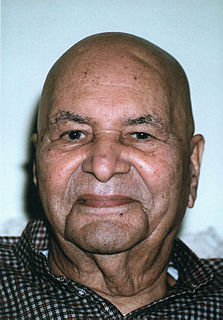A Quote by Bernard of Clairvaux
there are four degrees of love: 1) Love of self for self's sake. 2) Love of God for self's sake. 3) Love of God for God's own sake. 4) Love of self for God's sake.
Related Quotes
Feuerbach ... recognizes ... "even love, in itself the truest, most inward sentiment, becomes an obscure, illusory one through religiousness, since religious love loves man only for God's sake, therefore loves man only apparently, but in truth God only." Is this different with moral love? Does it love the man, this man for this man's sake, or for morality's sake, for Man's sake, and so-for homo homini Deus-for God's sake?
Be creative in that sense and your creativity will become an offering to God. God has given you so many gifts, Garima; something HAS to be done just in deep thankfulness. But remember: with no motive, not as a means but as an end unto itself. Art for art's sake, and creation for creation's sake, and love for love's sake, and prayer for prayer's sake.
It is good to love God for hope of reward, but it is better to love God for love's sake; and the prayer goes: O Lord, I do not want wealth nor children nor learning. If it be Thy will, I shall go from birth to birth. But grant me this, that I may love thee without the hope of reward 'love' unselfishly for love's sake.
God’s love sets us free from the need to seek approval. Knowing that we are loved by God, accepted by God, approved by God, and that we are new creations in Christ empowers us to reject self-rejection and embrace a healthy self-love. Being secure in God’s love for us, our love for Him, and our love for ourselves, prepares us to fulfill the second greatest commandment: To love our neighbor as ourselves.
Some people want to see God with their eyes as they see a cow, and to love Him as they love a cow - for the milk and cheese and profit it brings them. This is how it is with people who love God for the sake of outward wealth or inward comfort. They do not rightly love God, when they love Him for their own advantage.
We now possess four principles of morality: 1) a philosophical: do good for its own sake, out of respect for the law; 2) a religious: do good because it is God's will, out of love of God; 3) a human: do good because it will promote your happiness, out of self-love; 4) a political: do good because it will promote the welfare of the society of which you are a part, out of love of society having regard to yourself. But is this not all one single principle, only viewed from different sides?
The problem of reconciling human suffering with the existence of a God who loves, is only insoluble so long as we attach a trivial meaning to the word "love", and look on things as if man were the centre of them. Man is not the centre. God does not exist for the sake of man. Man does not exist for his own sake. "Thou hast created all things, and for thy pleasure they are and were created." We were made not primarily that we may love God (though we were made for that too) but that God may love us, that we may become objects in which the divine love may rest "well pleased".
It is one step, and a giant one, to see clearly and participate in the love that flows between the persons of the Trinity, but even here, God is seen as the object of his own love. It is yet another step to realize that God is beyond all subject and object and is Himself love without subject or object. This is the step beyond our highest experiences of love and union, a step in which self is not around to divide, separate, objectify or claim anything for itself. Self does not know God; it cannot love him, and from the beginning has never done so.































